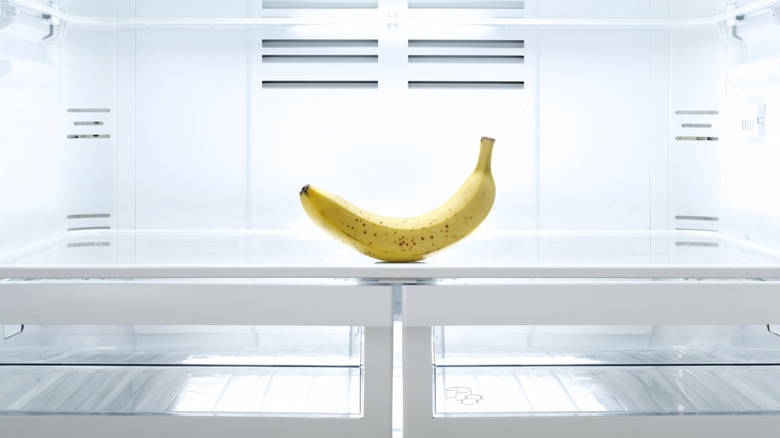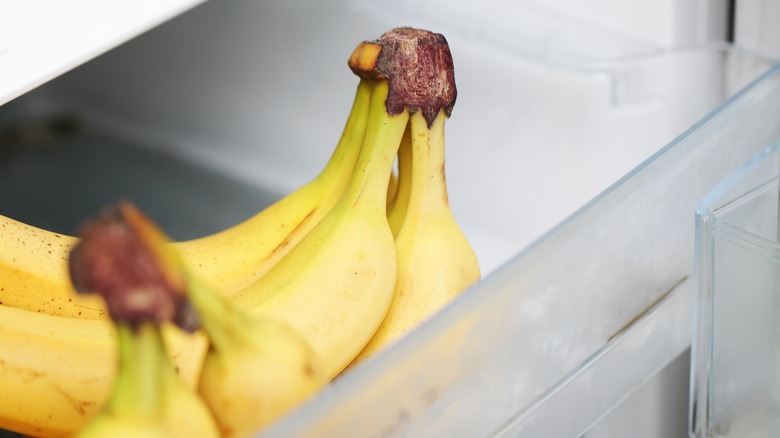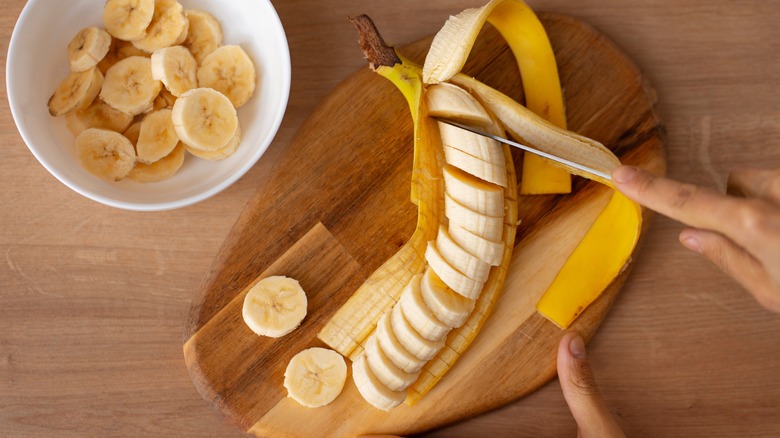Your Fridge Is Best For Banana Storage But There's A Catch
It goes like this: You pick up a bunch of bananas on your weekly grocery run, intending to use them throughout the week, and three days later you're stuck with a bowl of brown bananas on your kitchen counter. It seems like in the blink of an eye bananas can go from perfect to brown and mushy, good only for making a conciliatory loaf of banana bread (which, while delicious, might not have been in your original banana plans). This issue is altogether too common and is also completely avoidable. You only need to move your bananas from the counter to the refrigerator.
Placing your bananas in the refrigerator helps to slow down the ripening (and decaying) process, extending your fruit's shelf life. However, you don't want to store any and all bananas in the fridge, only ripe ones. Putting a bundle of green bananas in the fridge will keep them from reaching their ideal ripeness. Similarly, you cannot save overripe bananas by putting them in the fridge. For bunches that are already past their prime, you're better off putting them in the freezer for future banana baking endeavors – you might want to try your hand at a brown butter banana bread, for example.
How to spot a ripe banana, and how to store them
How can you tell if your bananas are ripe? You can start by looking at the stem. If the stem is green, your bananas aren't ripe yet. The stem of a ripe bunch will be yellow and should easily snap without bending when you pull a banana away from it. In terms of your banana's color, it should be yellow, with only a few brown spots. Look out for larger brown or black spots as these are indicators that your banana has crossed over into being overripe.
You will also want to be mindful of how you store your bananas in the fridge. First, you should not keep them in a bag, place them in a crowded part of your fridge, or bungle them up with other perishable fruits and veggies. Doing so will make bananas more likely to spoil, even in the fridge.
You also shouldn't keep them in the fridge for long time periods. After all, the fridge can help your bananas stay ripe for longer, but not forever. For optimal ripeness, keep your bananas in the fridge for five to seven days at a time. If you haven't eaten the bananas by then, you might want to go ahead and throw them out or use them for banana bread.
The specifics of banana storage
Once your bananas hit peak ripeness, you will want to put them in the fridge, but what if you need ripe bananas and all you have on hand is a bundle of green, unripened fruit? If you want to speed up the ripening process, you can always pull out a brown paper bag — do not use a plastic bag for this trick, as the moisture can cause fruit to decay. Simply place your fruit in the bag, close it, and let it sit for up to two days to help hurry the ripening process along. This trick also works for other fruits such as avocados.
But what if your bananas are ripe, and you have no space in your fridge to store them? If this is the case, there are a few methods you can use to ensure that they do not go bad as quickly. One trick calls for the use of plastic wrap, which is used to wrap the stems. This will prevent the output of ethylene, which causes produce to ripen (and over-ripen). You should also be mindful of placing your bananas in close proximity to other fruits and vegetables, as they also produce ethylene, which can also ripen your bananas. If you have room, and bananas ripe for use, you should really try and tuck them into your fridge. It might just save you a trip to the grocery store.


